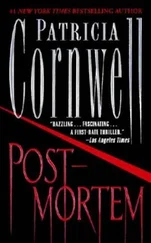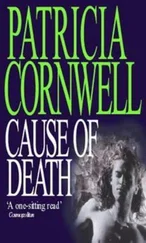Patricia Cornwell - From Potter's Field
Здесь есть возможность читать онлайн «Patricia Cornwell - From Potter's Field» весь текст электронной книги совершенно бесплатно (целиком полную версию без сокращений). В некоторых случаях можно слушать аудио, скачать через торрент в формате fb2 и присутствует краткое содержание. Жанр: Фантастика и фэнтези, на английском языке. Описание произведения, (предисловие) а так же отзывы посетителей доступны на портале библиотеки ЛибКат.
- Название:From Potter's Field
- Автор:
- Жанр:
- Год:неизвестен
- ISBN:нет данных
- Рейтинг книги:5 / 5. Голосов: 1
-
Избранное:Добавить в избранное
- Отзывы:
-
Ваша оценка:
- 100
- 1
- 2
- 3
- 4
- 5
From Potter's Field: краткое содержание, описание и аннотация
Предлагаем к чтению аннотацию, описание, краткое содержание или предисловие (зависит от того, что написал сам автор книги «From Potter's Field»). Если вы не нашли необходимую информацию о книге — напишите в комментариях, мы постараемся отыскать её.
From Potter's Field — читать онлайн бесплатно полную книгу (весь текст) целиком
Ниже представлен текст книги, разбитый по страницам. Система сохранения места последней прочитанной страницы, позволяет с удобством читать онлайн бесплатно книгу «From Potter's Field», без необходимости каждый раз заново искать на чём Вы остановились. Поставьте закладку, и сможете в любой момент перейти на страницу, на которой закончили чтение.
Интервал:
Закладка:
I glanced sharply at her as we walked. 'A reporter?'
'Well, he's really a copy editor or some such with the Times - one of these nutcakes who jogs no matter the weather. So he happens to be out in the park yesterday morning and takes a turn through Cherry Hill. It was very cold and snowy and deserted. He nears the fountain and there the poor woman is. Needless to say, the description in the morning paper is very detailed and people are frightened out of their wits.'
We passed through several doorways, then she poked her head inside the chief's office to gently announce us so we would not startle him. Dr. Horowitz was getting on in years and was getting hard of hearing. His office was scented with the light perfume of many flowering plants, for he loved orchids, African violets and gardenias, and they thrived in his care.
'Good morning, Kay.' He got up from his desk. 'Did you bring someone with you?'
'Captain Marino is supposed to meet us.'
'Emily will make certain he is shown the way. Unless you'd rather wait.'
I knew Horowitz did not want to wait. There was not time. He commanded the largest medical examiner's office in the country, where eight thousand people a year - the population of a small city -were autopsied on his steel tables. A fourth of the victims were homicides, and many would never have a name. New York had such a problem with identifying their dead that the NYPD's detective division had a missing persons unit in Horowitz's building.
The chief picked up the phone and spoke to someone he did not name.
'Dr. Scarpetta's here. We're on our way down,' he said.
I'll make sure I find Captain Marino,' Emily said. 'Seems like I know his name.'
'We've worked together for many years,' I told her. 'And he's been assisting the FBI's Investigative Support Unit at Quantico for as long as it has existed.'
'I thought it was called the Behavioral Science Unit, like in the movies.'
'The Bureau changed the name, but the purpose is the same,' I said of the small group of agents who had become famous for their psychological profiling and pursuit of violent sex offenders and killers. When I recently had become the consulting forensic pathologist for the unit, I had not believed there was much left that I had not seen. I had been wrong.
Sunlight filled windows in Horowitz's office and was caught in glass shelves of flowers and miniature trees. I knew that in the bathroom orchids grew in the steamy dark from perches around the sink and tub, and that at home he had a greenhouse. The first time I had met Horowitz he had reminded me of Lincoln. Both men had gaunt, benevolent faces shadowed by a war that was ripping society apart. They bore tragedy as if they had been chosen to, and had large, patient hands.
We went downstairs to what the N.Y. office called their mortuary, an oddly genteel appellation for a morgue set in one of the most violent cities in America. Air seeping in from the bay was very cold and smelled of stale cigarettes and death. Signs posted on aqua walls asked people not to throw bloody sheets, shrouds, loose rags or containers into Dumpsters.
Shoe covers were required, eating was prohibited and red biological hazard warnings were on many of the doors. Horowitz explained that one of his thirty deputy chiefs would be performing the autopsy on the unknown woman we believed was Gault's latest victim.
We turned into a locker room where Dr. Lewis Rader was dressed in scrubs and attaching a battery pack to his waist.
'Dr. Scarpetta,' Horowitz said, 'have you and Dr. Rader met?'
'We've known each other forever,' Rader said with a smile.
'Yes, we have,' I said warmly. 'But the last time we saw each other, I guess, was San Antonio.'
'Gee. Has it been that long?'
This had been at the American Academy of Forensic Sciences Bring Your Own Slide session, an evening once a year when people like us got together for show and tell. Rader had presented the case of a bizarre lightning death involving a young woman. Because the victim's clothing had been blown off and her head injured when she had fallen and struck concrete, she had come into the ME's office as a sexual assault. The cops were convinced until Rader showed them that the woman's belt buckle was magnetized and she had a small burn on the bottom of one foot.
I remembered after the presentation Rader had poured me a Jack Daniel's, neat and straight up in a paper cup, and we had reminisced about the old days when there were few forensic pathologists and I was the only woman. Rader was getting close to sixty and was much acclaimed by his peers. But he would not have made a good chief. He did not relish warfare with paperwork and politicians.
We looked like we were suiting up for outer space as we put on air packs, face shields and hoods. AIDS was a worry if one got a needle stick or cut while working on an infected body, but a bigger threat were infections borne on air, such as tuberculosis, hepatitis and meningitis. These days we double-gloved, breathed purified air and covered ourselves with greens and gowns that could be thrown away. Some medical examiners like Rader wore stainless steel mesh gloves reminiscent of chain mail.
I was pulling the hood over my head when O'Donnell, the detective I had met last night, walked in with Marino, who looked irritable and hungover. They put on surgical masks and gloves, no one meeting anybody's eyes or speaking. Our nameless case was in steel drawer 121, and as we filed out of the locker room, mortuary assistants hoisted the body out and set it on top of a gurney. The dead woman was nude and pitiful on her cold, steel tray.
Areas of flesh excised from her shoulder and inner thighs were ghastly patches of darkened blood. Her skin was bright pink from cold livor mortis, typical in frozen bodies or people who have died of exposure. The gunshot wound to her right temple was large caliber, and I could see at a glance the distinct muzzle mark stamped into her skin when Gault had pressed the pistol's barrel against her head and pulled the trigger.
Men in scrubs and masks rolled her into the X-ray room, where each of us was given a pair of orange-tinted plastic glasses to add to our armor. Rader set up a light energy source called a Luma-Lite, which was a simple black box with an enhanced blue fiber-optic cable. It was another set of eyes that could see what ours could not, a soft white light that turned fingerprints fluorescent and caused hairs, fibers and narcotic and semen stains to glare like fire.
'Someone hit the lights,' Rader said.
In the dark, he began going over the body with the Luma-Lite, and multiple fibers lit up like fine-gauge hot wire. With forceps, Rader collected evidence from pubic hair, feet, hands and the stubble on her scalp. Small areas of yellow got bright like the sun as he passed the light over the finger pads of her right hand.
'She's got some chemical here,' Rader said.
'Sometimes semen lights up like that.'
'I don't think that's it.'
'It could be street drugs,' I offered my opinion.
'Let's get it on a swab,' said Rader. 'Where's the hydrochloric acid?'
'Coming up.'
The evidence was recovered and Rader moved on. The small white light passed over the geography of the woman's body, into the dark recessed areas where her flesh had been removed, over the flat plain of her belly and gentle slopes of her breasts. Virtually no trace evidence clung to her wounds. This corroborated our theory that Gault had killed and maimed her where she was found, because had she been transported after the assault, debris would have adhered to drying blood. Indeed, her injuries were the cleanest areas of her body.
We worked in the dark for more than an hour, and she was revealed to me inches at a time. Her skin was fair and seemed a stranger to the sun. She was poorly muscled, thin, and five foot eight. Her left ear had been pierced three times, her right ear twice, and she wore studs and small loops, all in gold. She was dark blond with blue eyes and even features that may not have been so bland had she not shaved her head and were she not dead. Her fingernails were unpainted and chewed to the quick.
Читать дальшеИнтервал:
Закладка:
Похожие книги на «From Potter's Field»
Представляем Вашему вниманию похожие книги на «From Potter's Field» списком для выбора. Мы отобрали схожую по названию и смыслу литературу в надежде предоставить читателям больше вариантов отыскать новые, интересные, ещё непрочитанные произведения.
Обсуждение, отзывы о книге «From Potter's Field» и просто собственные мнения читателей. Оставьте ваши комментарии, напишите, что Вы думаете о произведении, его смысле или главных героях. Укажите что конкретно понравилось, а что нет, и почему Вы так считаете.












